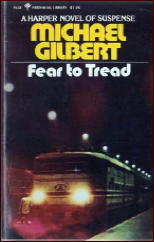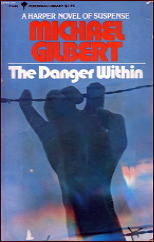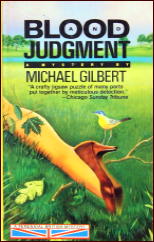Mon 7 Jul 2014
Reviewed by Marvin Lachman: Five by MICHAEL GILBERT.
Posted by Steve under Authors , Reviews[7] Comments
by Marv Lachman
Five recent reprints from Perennial Library [as of 1989] testify to the remarkable quantity and quality we have come to expect from Michael Gilbert. His second mystery, He Didn’t Mind Danger (1947), has been reprinted in this country in paper for the first time in more than twenty years; Lancer had published it under its British title, They Never Looked Inside.
We follow Major Angus McMann, who is shaken out of his boredom in post-war London when he gets involved with a particularly well organized gang of jewel thieves and finds himself not only helping Scotland Yard but even having his military commission reactivated. Some of Gilbert’s later work might be smoother but he has never been livelier, nor more readable.

The Danger Within (1952) has a most unusual setting, an Italian prisoner-of-war camp for British soldiers, but it is one Gilbert knows full well because he was a captive during World War II, until he escaped. There is both humor and suspense as the British plan an escape, only to find there is a traitor in their midst whose identity must be detected.
Death Has Deep Roots (1951) also has its roots in World War II. A British attorney (Gilbert’s profession) is asked to defend a young French woman accused of murdering her lover, a war hero. The legal pyrotechnics are well handled, but the book succeeds most notably with its compassionate picture of the characters.
World War II’s black market continued during England’s post-war austerity far longer than in the United States, and in Fear to Tread (1953) a British schoolmaster innocently becomes involved with a criminal gang. Such is Gilbert’s skill that we identify compulsively with this amateur sleuth as he battles them.
Blood and Judgment (1951) is an early case for one of Gilbert’s few professional detectives, Inspector (then Sergeant) Petrella of Q Division. Gilbert’s first series detective, Inspector Hazelrigg from Scotland Yard, was very intelligent but a bit bland. Petrella is young, enthusiastic, error-prone, but ultimately a hero who shows that, on the few occasions he essayed them, Gilbert was one of the best writers of police procedurals.


July 7th, 2014 at 6:35 pm
Something of an update: Nowadays some of Gilbert’s books have become available on Kindle. Both of the Calder and Behrens books can now be read at a reasonable price. Hooray!!!
July 7th, 2014 at 7:04 pm
Even though Perennial reprinted many of Michael Gilbert’s books here in the US in the late 1980s, I don’t think he even caught on here as a mystery writer. Some British authors just don’t, and while I may be wrong, I have the feeling that he was one of them.
The same is true for Andrew Garve, I’d say. Both were very good writers but in the US, no recognition at all.
July 8th, 2014 at 9:22 am
I know author Martin Edwards has recommended Gilbert’s books several times on his blog, including The Danger Within (under the title Death In Captivity). I have become a big fan, especially of his short stories.
July 8th, 2014 at 9:49 am
Here’s a link to one of Martin’s blog posts about Michael Gilbert. It isn’t a review but rather some reminiscences of talking to Gilbert on the telephone on several occasions, and how Gilbert was in many ways an inspiration to Martin in becoming both a solicitor and a mystery writer:
http://doyouwriteunderyourownname.blogspot.com/2009/02/michael-gilbert.html
July 8th, 2014 at 10:50 am
Rue Morgue Press has reprinted The Danger Within, and it’s a terrific book — interestingly, the most sinister character is an Italian fascist, not the usual German Nazi.
July 8th, 2014 at 7:02 pm
Gilbert remains my favorite, and not just because he was Raymond Chandler’s literary agent and British solicitor — he was Ian Fleming’s literary solicitor too.
These books, the Calder and Behrens stories, The Etruscan Tomb, The Long Journey Home, and several of his shorts remain some of my favorites. He was good at setting up the mystery and then delivering as well as a first class thriller writer. For a time Gilbert, Andrew Garve, Philip Loraine, Norman Lewis and a few others were turning out some remarkably good books.
The Danger Within is based on Gilbert’s time as a POW in Italy and touches on his remarkable escape with fellow thriller writer Norman Lewis. Lewis wrote the fascinating non fiction account, Gilbert wrote this.
July 8th, 2014 at 7:55 pm
OK, I’m convinced. I need to read some more of Michael Gilbert’s work, and I will, posthaste (which loosely translates to “as soon as I can”).